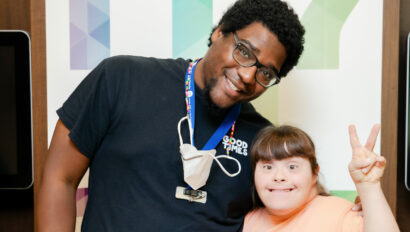It’s the Most Wonderful Time of the Year!
The holidays are all about family, friends, food and engaging in family traditions that make for meaningful memories! However, as we all know, the holidays can be very hectic as well, making it a particularly challenging time for parents and caregivers of children with special needs. The crowds, lights, noise, and change in routine can often be a recipe for stress and sensory overload.
The good news is that you can keep the stress to a minimum if you plan ahead. Here are some helpful tips to make your holiday season “the most wonderful time of the year!”
- Try to maintain as typical routine as possible
- Create a holiday calendar, marking activities you will do and the people you will visit. Attach photos if you have them.
- Plan healthy holiday meals and snacks together. Look through holiday cookbooks, find dishes your child will eat, and add them to your holiday menu or bring to a holiday dinner if you are not celebrating at home.
- Read books about holiday traditions with your child and create one or two new family traditions to mark each year as a family.
- Identify sensory-friendly events in your community, such as movies, concerts, etc., that can add meaning to your child’s holiday.
- Be OK with saying “NO’ and bow out of some holiday events if they become too much.
- Practice friendly holiday greetings
- Create social stories about special family outings and prepare in advance by explaining in detail what your child should expect when it comes to visiting relatives or exchanging gifts Read stories that illustrate these social interactions and role play through different dialogues and situations so your child is prepared about what they will experience during the holiday season.
- Keep a “comfort kit” for the road
- Set up a “holiday-free zone,” or ”escape space” at home where your child can go to decompress when the decorations, smells, lights and people become overwhelming. You might also put together a fun “survival kit” of holiday-themed, sensory-calming items such as a snowman squishy ball or a mini iPod with calming holiday music.
- Plan for a low stress day at home – watching favorite movies, snacking on favorite foods and just “hanging out.”
- Give small, immediate rewards and praise your child’s good behavior.
- Visit some holiday sights or see a holiday movie after the holidays when the crowds have died down.
- As the holiday season and vacation comes to an end, return to a regular sleep schedule before the return to school to ensure a smooth transition.
Whatever holiday traditions your family celebrates, the gift giving season has begun and it is important that you decide how you will be handling it as a family. Amanda Morin in her blog on Understood.org has a great strategy worth sharing. It’s called “Want, Need, Wear, Read: The Holiday Gift Strategy That Works for My Kids” and it describes her family’s W.E.A.R. approach to gift-giving that suggests limiting holiday gift-giving to four gifts:
- Something they WANT
- Something they NEED
- Something to WEAR and
- Something to READ
Want gifts are the things that your child is passionate about and will make them happy. Need gifts are things that might help them with a potential sensory or behavior issue, such as noise-cancelling headphones, a mini iPod, or a fun backpack to keep their things organized. Wear gifts are obviously apparel items, but to make it special, consider something that makes a ”Here I Am” statement for your child – something they identify with like a Tag less t-shirt. Read gifts are books that either speaks to your child’s interest and reading level, or books that can you, as the parent can read to your child.
These four gift categories set clear expectations, provide an organized structure to gift-giving and decrease levels of disappointment. It also gives your children a voice in what they want, need, wear and read.
While the challenges associated with the holidays can seem overwhelming, it is important to remember that they can be managed in productive and satisfying ways. The holidays are very special occasions and the end goal is still all about making our kids happy! With careful planning, creativity and a positive attitude, we can make this time a wondrous, joyful season that every family can and should look forward too! Happy Holidays!

Written by Shelley Levy
Director, Guttenberg Center for Special Services


